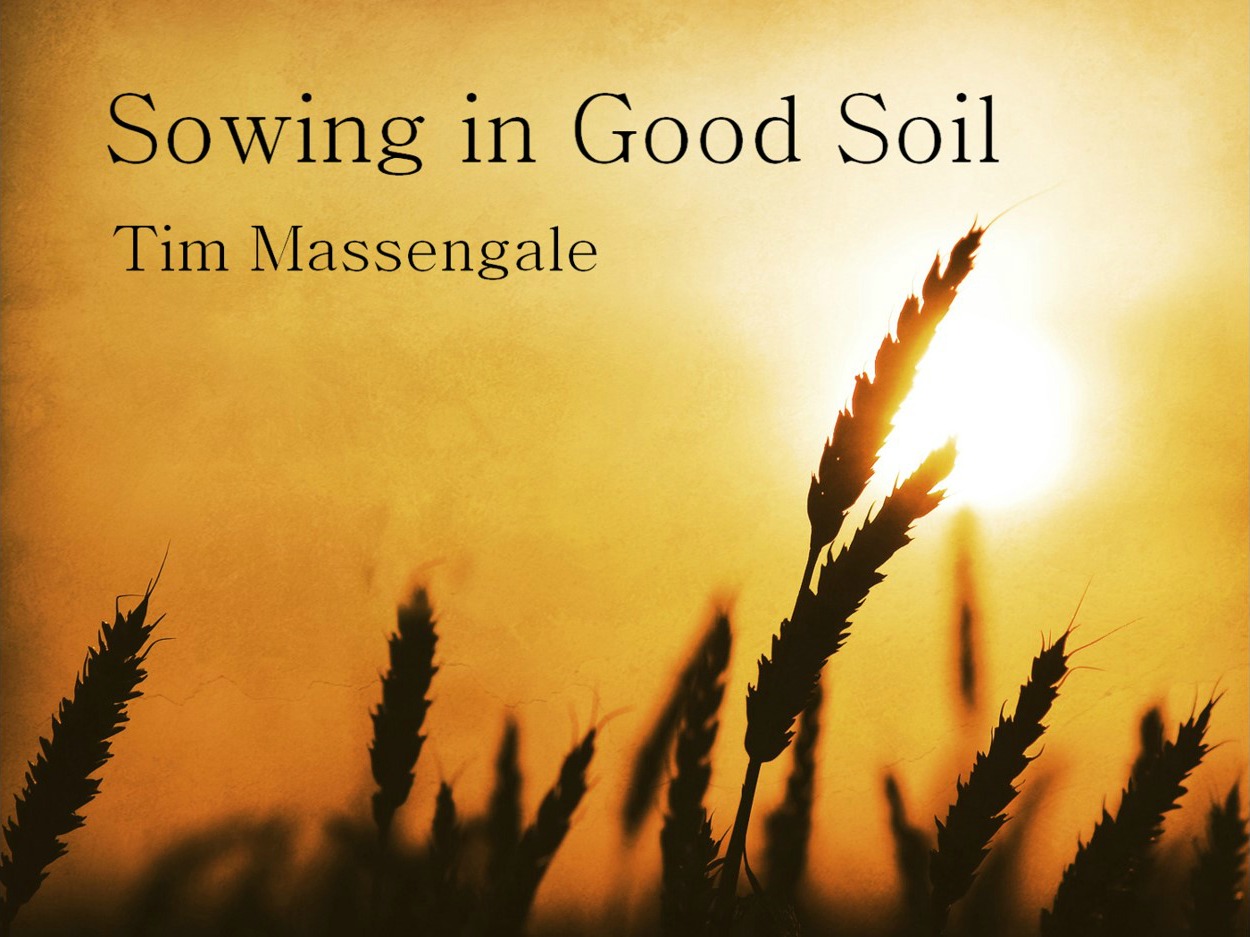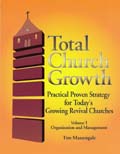Tim Massengale
Carl sat up a bit straighter in the seat and scowled at the old McCormick tractor below him. He wasn’t about to let this collection of rust and iron get the best of him. Carefully he adjusted the throttle down and increased the choke just a bit more.
“Lord, I need your help here!” he growled to himself. He was getting used to the old tractor’s peculiarities. But sometimes it didn’t want to cooperate no matter what he did.
The old engine turned over three times, coughed loudly, and then roared into life with a mighty belch of white smoke. Carl grinned. With only twenty more acres to plow, he should be through by dinner time. Putting the tractor into gear, he carefully pulled out into the field.
Five hours later, he was done. He looked at the freshly turned soil and thought over what the Ag Extension Rep had told him. “First, plow your soil to an 8” depth. Next, test the soil and, if needed, add a soil conditioning agent to balance your PH level. Third, form your seed beds with 18” wide rows. Fourth, inject your starter fertilizer along with your seed. Drill your seed no deeper then 1½ inches. You should have seed emergence within 10-12 days, weather permitting.”
It sounded easy when the old fellow had explained it. But those simple steps took many dozens of hours to accomplish. He looked over the gently rolling hills that would soon be covered in soybeans. Silently he prayed, “Lord, with your help, I will have my first harvest this fall. You, my God, are the Lord of the harvest. Help this harvest to be successful. And thank you, Lord, for giving me this opportunity.”
It was getting dark when Carl latched the barn door and turned toward the old farm house where his wife and children were waiting dinner. He felt a surge of confidence. It was going to be a good year.
Preparing the Soil
Carl quickly learned that successful farming was more than simply putting seeds into the ground. It also required many hours of work before the first seed could be planted. Likewise, a church must understand that soil preparation is a prerequisite to bringing in a harvest of souls. The seed is the Word of God. The sower is you and I, who are laborers together with Him. And the soil is the lost of this world. We must choose carefully where we sow the seed of God’s word. Why? Because the church has only so many laborers to send into the harvest. They can spend their time sowing seed in poor soil or in good soil. But since we have a limited number of workers and these workers have a limited amount of time they can contribute, we need to utilize the resources that the Lord had given us wisely.
Jesus told us that there are different types of ground (Luke 8:4-8). Some soil will be hard and unyielding, refusing to allow the seed to enter their heart. Others will be full of thorns and weeds. Still others will be shallow and full of stones. But much soil will be fertile and open to the seed of truth and new life will spring up. A wise farmer knows that if he conditions the soil properly, his yield will be far greater than if he casts the seed upon unprepared ground.
So let’s look at the many places that the church can consider planting the Gospel and see how we might prepare these hearts for God’s Word.
Good Soil: Family, Friends, and Acquaintances
If you stand before a congregation of 100 Apostolic saints and ask them who brought them into the truth, and over 90% will say they were won to the Lord by either a family member, a friend, a co-worker, or an acquaintance. Less than 5% were won by a stranger they had never met before. This makes oikos the most effective method of evangelism. Oikos is the Greek word for ‘household.’ When in Acts 16:15 it states, ‘And she (Lydia) was baptized and her household,’ the word used here is oikos. It means much more than just immediate family members.
Your oikos is your best ground. Every child of God should take the time to list everyone they know. Turn this into a prayer list. Ask the Lord to help you speak to everyone on your oikos list at least once each year (ie: make it happen!), and more often if the opportunity presents itself. Invite them to church! Offer them a home Bible study!
Good Soil: Our Own Hearts
Jesus told us, ‘and ye shall be witnesses unto me…’ (Acts 1:8). Jesus also admonished us to ‘let your light so shine before men…’ Light that does not shine serves no more purpose than salt that has lost its savour (Matt. 5:13-16). The scriptures abound with encouragement for every child of God to witness and share the truth with the lost at every opportunity.
However people are often reluctant to witness. A major reason for this lies in not knowing what to say and what scriptures to use. We must teach our people how to witness. Share with them several standard statements and questions that will open the door to sharing your own personal testimony. Stress that the most powerful tool you have is not necessarily your knowledge of the scripture but your own testimony of what the Lord has done in your life. People can argue with your doctrine and interpretation of scripture. But they cannot argue with what the Lord has done for you personally.
There are many excellent training courses available that will teach you how to witness easily and effectively. While many of these are denominational, they will show you how to lead someone to repentance — which must come first before baptism and receiving the Holy Ghost.
Good Soil: Church Visitors
This is by far the best soil you have. Over 80-90% of all visitors are from the oikos of your church members. Hopefully they feel the wonderful touch of the Holy Ghost and the preaching moved their hearts. But regardless of whether they came to the altar or not, we must not neglect this high quality soil. Every visitor should be made to feel welcome and wanted.
Every visitor should receive a phone call and a letter within days after their visit. We should have a program in place to visit them three or four times a year to invite them back to upcoming events. During this visit we should offer them a home Bible study. We should also pray with them and for them. We pray with them on the door step as we visit by simply asking, “Do you have any special needs that you would like the church to pray with you about?” After they share their needs you then ask, “Would you mind if we had a quick word of prayer with you right now about these needs?” I have seen people begin to weep as you lead them in a simple prayer about their sick loved one or a serious problem in their family. Also, all visitors should be placed on your mailing list to receive regular invitations to all special church functions.
Work the soil! Your visitors are the best prospects you have. 95% of all who receive the Holy Ghost in your church will have come 3-5 times before receiving it. They have come once. Now you need to encourage them to come back.
Good Soil: Bus Ministry Parents
Bus ministry works! It works to win children, teens, and parents. But to win souls from bus ministry you have to work it. How? First, fill your bus with children by whatever method works best: contests, give-a-ways, special Sundays, etc. If possible, focus on picking up children from established neighborhoods rather than high-transit housing.
Second, reach the children with salvation by providing regular opportunities for them to receive the Holy Ghost: Children’s church, super church, monthly Holy Ghost Sunday, scholarships to summer youth camp, run the busing evenings during revivals, etc. Reach for the souls of your bus children!
As these children grow up, involve them in your youth group starting from age eleven or twelve. This will require you to provide transportation for all bus youth to attend all scheduled youth activities. Then third, reach for the bus parents utilizing the concepts found in ParentReach. This program (from Total Church Growth) will see parents saved from your bus ministry every year.
Good Soil: Benevolence Ministries
A large percentage of people that are saved began their search for God because of a crisis in their life: Deaths, divorce, health problems, accidents, a near death experience, loss of job, loneliness, financial problems, homelessness, incarceration, child problems, drugs and alcohol, etc. It is during these times of crisis that we discover our need for God. The church must be there to show them the way. So churches that provide programs to minister to people in these type situations will see a steady flow of converts as a result. These can include food and clothing pantries, grief counseling, financial seminars, child care, parenting classes, drug and alcohol intervention, hospital ministry, marriage counseling, singles ministries, elder care, and more. Find a need in your community and fill it. It will put you into direct contact with people who are feeling out of control and looking to God for help. Help them!
Good Ground: Institutional Evangelism
Various institutions are filled with people in the midst of a crisis: Hospitals, nursing homes, jails, prisons, homeless shelters, half-way houses, drug rehab centers, juvenile halls, teen centers – the list goes on. Many of these centers welcome churches coming in to hold Bible studies and services. Visit with the director and see just how you can help. It may not begin with a church service. It might begin with encouraging your saints to volunteer both time and talents. But this is good soil. Get your foot in the door and it can lead to an opportunity to hold Bible studies, build relationships, and see many souls saved.
Conclusion
There are many other places to find quality soil. But the bottom line is this: We must place our confidence in the seed of the Word of God. We must work the soil to enable the seed to germinate. If we will do our part the Lord has assured us, ‘He that goeth forth and weepeth, bearing precious seed, shall doubtless come again with rejoicing, bringing his sheaves with him.’ (Psalms 126:6) We must sow seed and lots of it. But we need to focus our efforts on sowing in the best possible soil. Good seed and good ground. The result will be a good and plentiful harvest.





1 thought on “Sowing In Good Soil (Entire Article)”
Comments are closed.